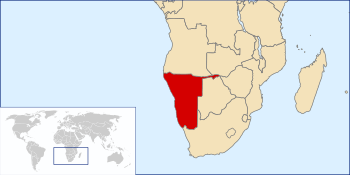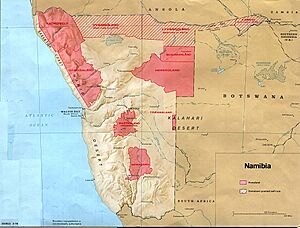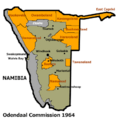South-West Africa facts for kids
Quick facts for kids
South-West Africa
Suidwes-Afrika
Zuidwest-Afrika Südwestafrika |
|||||||||
|---|---|---|---|---|---|---|---|---|---|
| 1915–1990 | |||||||||
|
Flag (1928-1990)
|
|||||||||

Location of South-West Africa
|
|||||||||
| Status | Mandate of South Africa | ||||||||
| Capital | Windhoek | ||||||||
| Common languages | English, Afrikaans, Khoekhoe, Dutch (1915-1983) and German (1884-1990) | ||||||||
| History | |||||||||
|
• Established
|
1915 | ||||||||
| 1919 | |||||||||
|
• Independence
|
21 March 1990 | ||||||||
| Currency | South West African pound (1920–61) South African rand (1961–93) |
||||||||
|
|||||||||

South-West Africa was the name for the country we now call Namibia. It was used when the area was ruled by the German Empire and later by South Africa.
Contents
German Rule in South-West Africa
From 1884 to 1915, South-West Africa was a German colony. It was known as German South-West Africa (Deutsch-Südwestafrika in German).
Germany found it hard to control this land. There were many rebellions against their rule.
The important port city of Walvis Bay and the Penguin Islands were not part of the German colony. They were taken by Great Britain in 1878. These areas later became part of the Cape Colony. In 1910, the Cape Colony joined the Union of South Africa.
South African Control
In 1915, during World War I, South Africa took control of the German colony. After the war, it became a special territory called a League of Nations Mandate. This meant the Union of South Africa was in charge of running it.
In 1946, the League of Nations was replaced by the United Nations. The plan was for South-West Africa to become a United Nations Trust Territory. This would have given the UN more say in its future.
However, South Africa refused to let this happen. They wanted to treat South-West Africa like it was their own fifth province. But it was never officially made a part of South Africa.
In 1966, the United Nations ended South Africa's right to rule South-West Africa. They said South Africa had no right to be there anymore. But South Africa did not leave.
In 1971, the UN again said that South Africa's control was against the law. They told South Africa to leave the territory. Still, South Africa refused to go.
Independence for Namibia
On March 21, 1990, South Africa finally gave independence to the territory. It was then named the Republic of Namibia.
However, Walvis Bay and the Penguin Islands were still controlled by South Africa. These areas only became part of Namibia in 1994.
Images for kids
-
Allocation of land to bantustans according to the Odendaal Plan, with grey being Etosha National Park
See also
 In Spanish: África del Sudoeste para niños
In Spanish: África del Sudoeste para niños
 | James Van Der Zee |
 | Alma Thomas |
 | Ellis Wilson |
 | Margaret Taylor-Burroughs |



